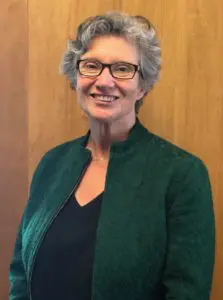
By Linda Jackson, AAI Program Director
I grew up with older people around me. My dad was 50 and my mother was 37 when I was born. My dad and I played rugged games of ping pong when I was 16 (and he was 66). My mom retired at 65, and continued to be active in the neighborhood and the League of Women Voters. I never thought of them as old.
I was also fortunate to have older mentors at work who would give me the history behind a policy or the background on the people leading initiatives. I never thought of them as old either.
Confession: I am GUILTY of all the assumptions below about older people. Looking back, I blame it on that marvelous confidence of youth. I also blame it on blindness of prejudicial ignorance, and that is something we can address in our work against ageism.
“I know about older people, because I know some. I have parents and grandparents!”
Why do we assume that we can generalize about a whole population cohort? It’s a fallacy to take a few experiences and generalize that to be representative of a whole population.
Imagine the group of people 65 and older. There are three generations in this group: people who remember the depression, those who came of age during WWII, and those who experienced the civil rights marches and war protests of the 60s. Depending on their family’s race, education, income and status, health indicators vary tremendously.
Working with older people, we find that, as with all other population cohorts, there is an immense diversity of experience and conditions to learn about and support. We can make a difference by listening to the diverse universe of experiences of people over 60.
“Old people are forgetful, slow, sour and stuck in the past. I know what is best for them.”
A characteristic of prejudice is a paternalistic attitude based on ignorance. One sign of wisdom is understanding that we can learn from those who have traveled the road before us. We can help by making sure that older people are at the table of decision-making, with the same intention and respect offered other ages. Their life experiences add depth and dimension — we just need to include them and listen.
“Older people are going to die, so younger people have more value.”
Who was more blatant about this than Texas Lieutenant Governor Dan Patrick, who said “As a senior citizen, are you willing to take a chance on your survival in exchange for keeping the America that all America loves for your children and grandchildren? . . . If that is the exchange, I’m all in. …Let’s be smart about it and those of us who are 70-plus, we’ll take care of ourselves.”
In counterpoint we have geriatrician Louise Aronson, MD, MFA, author of Elderhood: Redefining Aging, Transforming Medicine, and Reimagining Life, who asks why we demote an entire population from equal care, setting “a precedent for treating others with the same disregard.”
Triage, essential when dealing with scarcity and tragedy, is the science and judgement of deciding who receives care and who should not. In some countries, including the U.S., doctors have considered guidelines that younger people should have precedence. This is in the face of increasingly longer life and healthier lifespans negating the assumption that younger people have more value.
Some people have stepped forward to say the same value should be attributed to human lives without regard to age, disability, gender, race or ethnicity. Rationing of health care should not be based on arbitrary judgements of age, ability or any other inherent characteristic.
“Older adults are luddites about technology. Not only that, they don’t like change!”
COVID-19 has shown us that older people are savvy about tech and wise about how much time they want to spend on it. Older people, as non-tech natives, know the importance and value of being present in the real world compared to the ephemeral experiences of the online world.
Age-friendly surveys and COVID-19 wellness checks show a high level of tech use. For example, grandparents learned about Zoom for games with grandchildren at the same time as their children learned about Zoom for work.
The bottom line is that connections and communication are essential for the functioning of our society. Tech is a technique, a skill, a form of engagement that is beneficial to all that must be seen as appropriate and accessible to all, not just younger people.
“Older people don’t have anything to contribute anymore. ”
“Never trust anybody over 30.” That arrogance worked until I turned 30!
Now that we are sheltering-in-place, isolated, with atrophy in body, mind and spirit, what is needed is equal and appropriate consideration to the well-being of all people sheltering away and those essential workers on the front lines.
As we look for guidelines, policies and programs to help older people have work and volunteer experiences, healthcare, homecare, and social contact needed for well-being, we must insist on including older people in the planning and development of these tools. With their help, we can work towards better understanding about ageism and negative stereotypes.
We can’t do right by our work with and for older people until we face the prejudices we carry inside. In understanding ageism, we can begin to understand racism, ableism, and sexism. These assumptions, with a change in focus, can be applied to the ‘other’ and devalue a whole population’s abilities, experiences, contributions and potential.
Find yourself some older people to fill your circle with wisdom and perspective. I’m grateful for the mentors in their 70s, 80s and 90s in my life — they are teachers, and help me understand why things are the way they are. I hope you have some mentors too!


